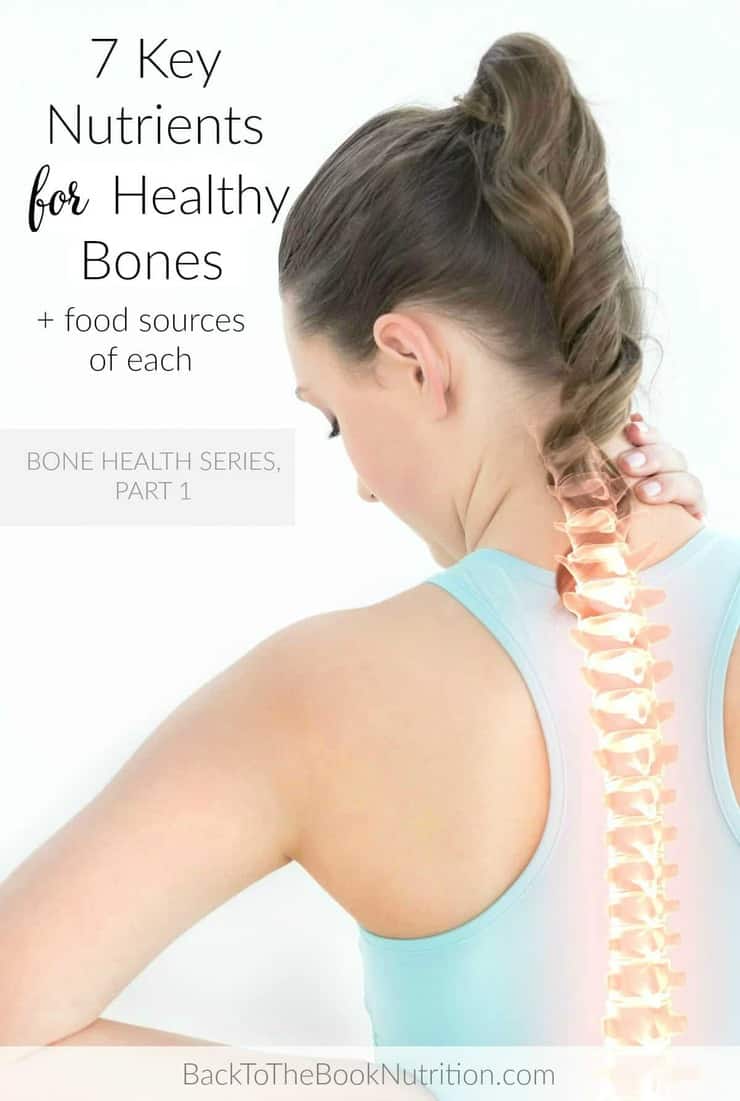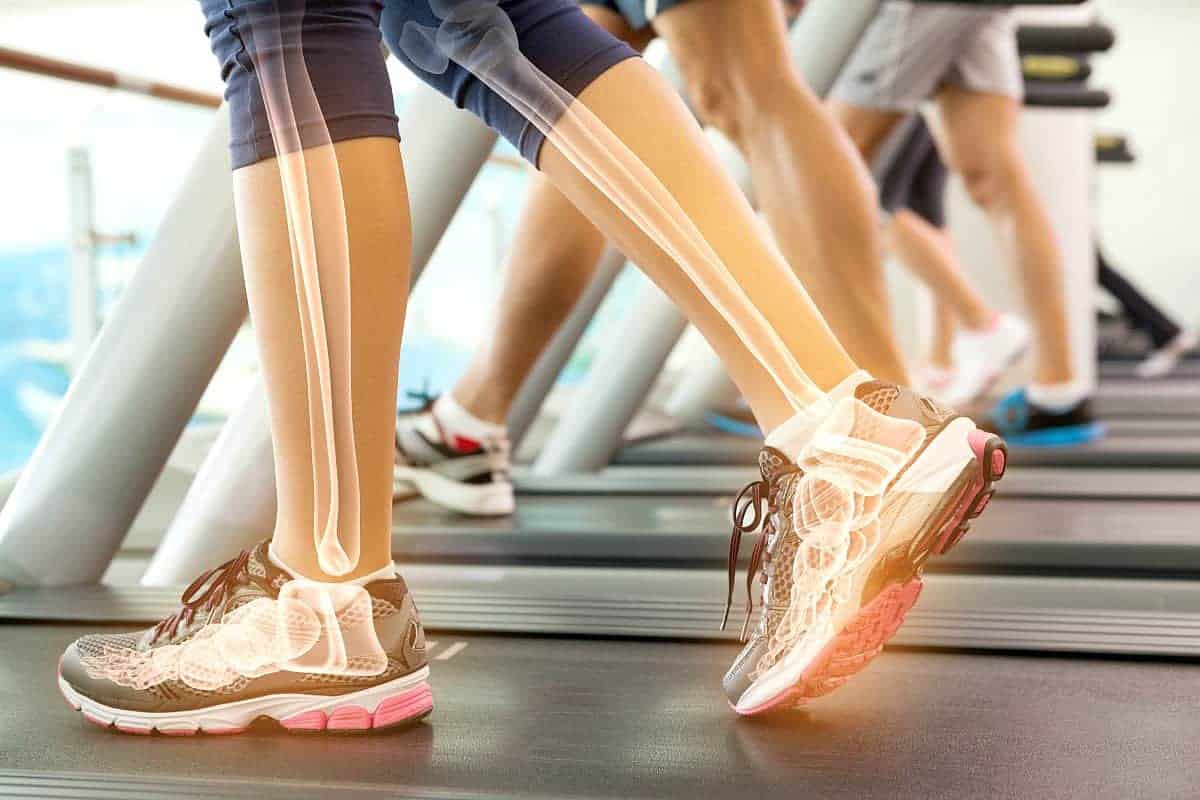Bone health goes way beyond calcium and vitamin D – boost your intake of these 7 key nutrients for healthy bones!
Note from Dena: This guest post was written by Keri Carpenter, Dietetic Intern, as part of a research partnership between Back To The Book Nutrition and post-graduate nutrition students from the University of Houston.
Dem bones, dem bones, dem bones.
Did you know that by 2030, over 71 million people will have osteoporosis or osteopenia (pre-osteoporosis)? And, since we begin losing bone mass in our mid-thirties, now is the time to do everything we can to slow that process.
Bones are vital organs in the body helping with functions like daily movement, mineral and nutrient storage, and blood cell production.(7) And, with 206 of them in each of our bodies, we can’t afford not to take care of them!
7 Key Nutrients for Healthy Bones + Food Sources of Each
1. Calcium
What Calcium Does:
We all know calcium helps strengthen bones and teeth, but it’s also involved in contraction of muscles (including the heart!) and proper blood clotting. If we don’t get enough calcium in our diets, the body will steal calcium from the bones to fuel its role in other areas of the body. (1,2,6,11)
Food Sources of Calcium:
- Milk from cows or goats
- Cheese
- Yogurt
- Canned Sardines (whole with bones – look for those that do not say “boneless”)
- “Traditional” canned salmon (packed with bones – look for those that do not say “boneless”)
- Almonds
- Kale, Collards, and other dark leafy greens
- Bok choy
- Whole and traditionally prepared soy products (soybeans, tofu, etc.)
2. Vitamin D
What Vitamin D Does:
Vitamin D from foods or sunlight if first activated through some fancy scientific pathways within the body (we won’t go into too much detail here, but feel free to read more) Once activated, Vitamin D is called Calcitriol which helps regulate the amount of calcium released into the blood and absorbed by the intestines for use throughout the body.
Food Sources of Vitamin D:
- Salmon
- Sardines
- Egg yolks
- Cod Liver Oil
- Sunlight (not a food but an excellent source!)
(21)
3. Vitamin K2
What Vitamin K2 Does:
When we hear ‘Vitamin K’, most of us think of blood clotting. It’s true that one form of Vitamin K – K1 – from green leafy vegetables helps with clotting. But vitamin K2 has an entirely different role in the body. K2 helps ensure calcium is deposited into the bone where it belongs, rather than in arteries and soft tissue like the heart and kidneys. Low vitamin K intake has been linked to osteoporosis and K2 has even been used to treat osteoporosis in some parts of the world (9,10)
Food sources of Vitamin K2:
- Whole milk dairy products
- Liver and other organ meats
- Egg yolks
- Fermented soy (natto, etc.)
(13,14)
4. Magnesium
What Magnesium Does:
It helps with bone structure by working together with calcium and potassium to regulate bone turnover. It also can help decrease inflammation in the body, which has been linked to bone loss.
Food Sources of Magnesium:
- Brown rice
- Spinach
- Almonds
- Swiss chard
- Lima beans
- Peanuts
(18)
5. Phosphorus
What Phosphorus Does:
Phosphorus gives strength to bones and teeth, and helps regulate blood levels of calcium. Phosphorus deficiencies have been linked to bone pain and osteomalacia (bone softening). (22)
Food Sources of Phosphorus:
6. Copper
What Copper Does:
Copper works together with other nutrients in the formation of bone and connective tissue like collagen. It also helps transport iron to the bone marrow where red blood cells are made. (23)
Food Sources of Copper:
- Liver and other organ meats
- Seafood (Crab, oysters, mollusks, etc.)
- Cashews
- Sunflower seeds
- Almonds
- White mushrooms
7. Protein
What Protein Does:
Even this macronutrient is beneficial for your bones. It can also help with the absorption of calcium in the intestines and recent research shows it can be helpful in preventing bone fractures by increasing activity of osteoblasts, the cells that build bone.
Food Sources of Protein:
- Meats, poultry, and fish
- Eggs
- Dairy products
- Quinoa
- Beans and lentils
(15,19)
What About Supplements?
Calcium and vitamin D supplements have been advised for so long, we take their safety and effectiveness for granted. However, newer research questions the higher doses of these and other nutrients that were previously recommended. It’s important to remember that nutrients work together in the body rather than in isolation. Aiming to include food sources of the above nutrients in your daily diet is best, since that will provide a combination of nutrients and cofactors to assist in their action. Discuss with a licensed practitioner whether additional moderate doses of supplements are right for you.
Read Part 2 in this series – 13 Non-diet Lifestyle Factors that Affect Bone Health!
About the Author
Keri Carpenter is passionate about food and its impact on the health of an individual, the importance of current nutritional epidemiology, and the need to promote self-efficacy with patients in order to combat chronic disease epidemics. These passions led her to pursue a Master of Public Health with the University of North Carolina at Greensboro and the credentials to be a dietetic intern with the University of Houston.
Disclaimer: Information on this site is intended only for informational purposes and is not a substitute for medical advice. Always consult with a trusted healthcare provider before implementing significant dietary change. Read additional disclaimer info here.
References
- https://www.nichd.nih.gov/health/topics/bonehealth/conditioninfo/calcium
- https://www.nof.org/patients/treatment/calciumvitamin-d/a-guide-to-calcium-rich-foods/
- https://ods.od.nih.gov/factsheets/VitaminD-HealthProfessional/
- https://www.ncbi.nlm.nih.gov/pmc/articles/PMC4566462/
- https://www.ncbi.nlm.nih.gov/pubmed/11374034
- https://lauraschoenfeldrd.com/update-calcium-getting-enough/
- https://www.drperlmutter.com/healthy-microbiome-healthy-bones/
- https://www.ncbi.nlm.nih.gov/books/NBK56058/table/ch6.t2/?report=objectonly
- http://lpi.oregonstate.edu/mic/health-disease/bone-health#micronutrients
- (sources:https://wellnessmama.com/54423/vitamin-k2-uses-benefits/; https://www.ncbi.nlm.nih.gov/pubmed/15802772)
- http://lpi.oregonstate.edu/mic/minerals/calcium#food-sources
- https://chrismasterjohnphd.com/2016/12/09/the-ultimate-vitamin-k2-resource/?_sf_s=kidney+disease
- https://pubs-acs-org.libproxy.uncg.edu/doi/pdf/10.1021/jf052400h
- https://articles.mercola.com/sites/articles/archive/2013/10/12/vitamin-k2-benefits.aspx
- https://www.nap.edu/read/11537/chapter/14#151
- https://www.drkarafitzgerald.com/2015/09/08/episode-5-osteoporosis-metabolic-disease-of-the-bone-with-dr-keith-mccormick/
- https://ods.od.nih.gov/factsheets/Magnesium-HealthProfessional/
- http://lpi.oregonstate.edu/mic/minerals/magnesium#food-sources
- https://www.ncbi.nlm.nih.gov/pubmed/22139564
- http://drhyman.com/blog/2010/08/24/vitamin-d-why-you-are-probably-not-getting-enough/
- http://lpi.oregonstate.edu/mic/vitamins/vitamin-D#food-sources
- http://lpi.oregonstate.edu/mic/minerals/phosphorus
- http://lpi.oregonstate.edu/mic/minerals/copper




I think nowadays it’s more of hidden hunger than real hunger in developed countries. Like everyone has instant or fast food or junk food and gets filled enough to carry on with the day but never get the nourishment and nutrition to actually make their body’s functions work properly. I think your blog should serve as an eye opener for them. Everyone needs to intake their minerals as well.
Thank you, Aditi. You’re right about fast food feeding us but not nourishing us. 🙁
Great info! My husband doesn’t get a lot of sunshine where he’s at and I’ve made him take Vitamin D supplements on a daily basis.
That’s great, Czjai – If you’re able to, I’d recommend getting a D supplement that also has K2 in it since K2 compliments vitamin D’s activity so well.
So good to know! I’ll need to be more careful about what I’m intaking 🙂
It definitely matters! Thanks for reading and for your comment, Megan! 🙂
Both of my great-grandmothers had osteoporosis so it’s something I know I need to watch and be aware of. Thankfully, my toddler keeps me buying milk and yogurt so we get plenty of calcium.
Yes, definitely keep an eye on all the factors mentioned here, Marie!
Excellent reminder that we need to pay attention to our bone health. Thanks for including the food sources for each vitamin/nutrient. I prefer food to supplements.
Yes – food is always best! Thanks for your comment, Nancie!
It is always good to take a blood test and check vitamin levels. In my case vitamin D is low and it is important that take a vitamin and also spend time outdoors for a bit of sunlight.
Yes, definitely! It’s shocking how many people are low in vitamin D and other nutrients these days!
I love that this post contains so much information and is presented in a way that made it easy to absorb. I also really love that you included a list of sources. So often it’s difficult to decide what information I read is valid or not.
I’m so glad it was helpful to you, Christa!
I’m lactose intolerant and have been worried about Osteoporosis for years! I got checked in college and so far so good. But, I’m trying to get as much calcium as I can, just in case!
Great, and definitely work on the other factors outlined here too, Marcie!
I’m in my late thirties now, I should start taking better care of my bones before it’s to late.
Yes, you should! And I hope this article is helpful to you!
I’m trying to get more into nutritional cooking so this is really helpful, thank you for sharing this.
You’re welcome, Ellie!